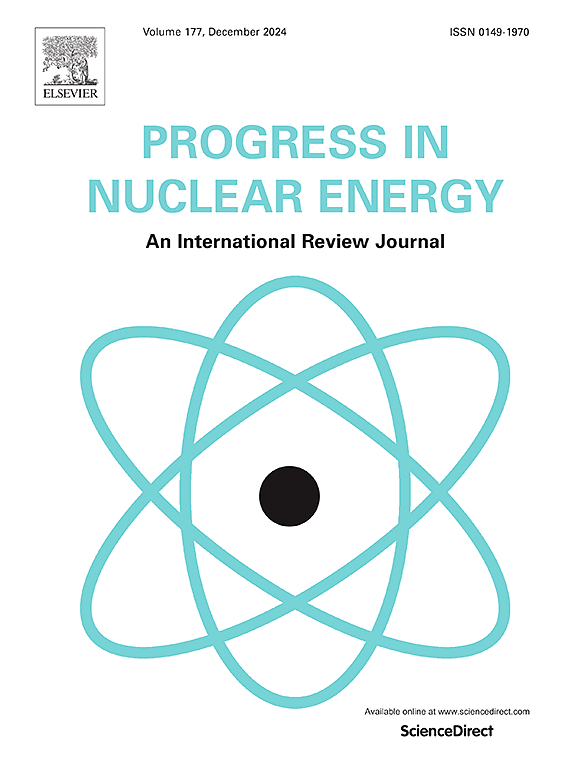Regenerating and estimating missing parameters in critical benchmark experiments: A framework for inverse uncertainty quantification using information-theoretic experiment design
IF 3.2
3区 工程技术
Q1 NUCLEAR SCIENCE & TECHNOLOGY
引用次数: 0
Abstract
The verified benchmark data are integral validation components of contemporary neutronics calculation, which plays a crucial role in advanced modeling and simulation, criticality and reactor safety analysis, and nuclear data testing. Nevertheless, the phenomenon of retained experiment data loss has occurred occasionally in recent years, causing great difficulty and influence on the formulation and compilation of benchmark in international evaluation projects. Therefore, we proposed a comprehensive approach to address the issue of data missing in benchmark experiments. In this paper, we use the Bayesian inference framework, combined with the information theory method, to give a general process framework for dealing with missing data estimation. This framework spans from experimental strategies design to experimental data acquisition, and further to Bayesian inverse uncertainty quantification (IUQ) based on the obtained data. It indicates that this approach can effectively reduce the uncertainty of unknown parameters with fewer IUQ evaluation times, and provide the effective estimation of missing data. The results obtained her e not only provide a theoretical basis for regeneration and estimation methods of missing parameters in critical benchmark experiments, but also have great engineering application prospects in parameter estimation and model calibration.
关键基准实验中缺失参数的再生与估计:基于信息论实验设计的逆不确定性量化框架
经过验证的基准数据是当代中子计算不可分割的验证组成部分,在先进的建模与仿真、临界与反应堆安全性分析、核数据测试等方面发挥着至关重要的作用。然而,近年来实验留存数据丢失的现象时有发生,给国际评价项目基准的制定和编制带来了很大的困难和影响。因此,我们提出了一种综合的方法来解决基准实验中数据缺失的问题。本文采用贝叶斯推理框架,结合信息论方法,给出了一个处理缺失数据估计的通用流程框架。该框架涵盖了从实验策略设计到实验数据采集,再到基于所获得数据的贝叶斯反不确定性量化(IUQ)。结果表明,该方法能有效降低未知参数的不确定性,减少IUQ评估次数,对缺失数据进行有效估计。所得结果不仅为关键基准实验中缺失参数的再生和估计方法提供了理论依据,而且在参数估计和模型校准方面具有很大的工程应用前景。
本文章由计算机程序翻译,如有差异,请以英文原文为准。
求助全文
约1分钟内获得全文
求助全文
来源期刊

Progress in Nuclear Energy
工程技术-核科学技术
CiteScore
5.30
自引率
14.80%
发文量
331
审稿时长
3.5 months
期刊介绍:
Progress in Nuclear Energy is an international review journal covering all aspects of nuclear science and engineering. In keeping with the maturity of nuclear power, articles on safety, siting and environmental problems are encouraged, as are those associated with economics and fuel management. However, basic physics and engineering will remain an important aspect of the editorial policy. Articles published are either of a review nature or present new material in more depth. They are aimed at researchers and technically-oriented managers working in the nuclear energy field.
Please note the following:
1) PNE seeks high quality research papers which are medium to long in length. Short research papers should be submitted to the journal Annals in Nuclear Energy.
2) PNE reserves the right to reject papers which are based solely on routine application of computer codes used to produce reactor designs or explain existing reactor phenomena. Such papers, although worthy, are best left as laboratory reports whereas Progress in Nuclear Energy seeks papers of originality, which are archival in nature, in the fields of mathematical and experimental nuclear technology, including fission, fusion (blanket physics, radiation damage), safety, materials aspects, economics, etc.
3) Review papers, which may occasionally be invited, are particularly sought by the journal in these fields.
 求助内容:
求助内容: 应助结果提醒方式:
应助结果提醒方式:


